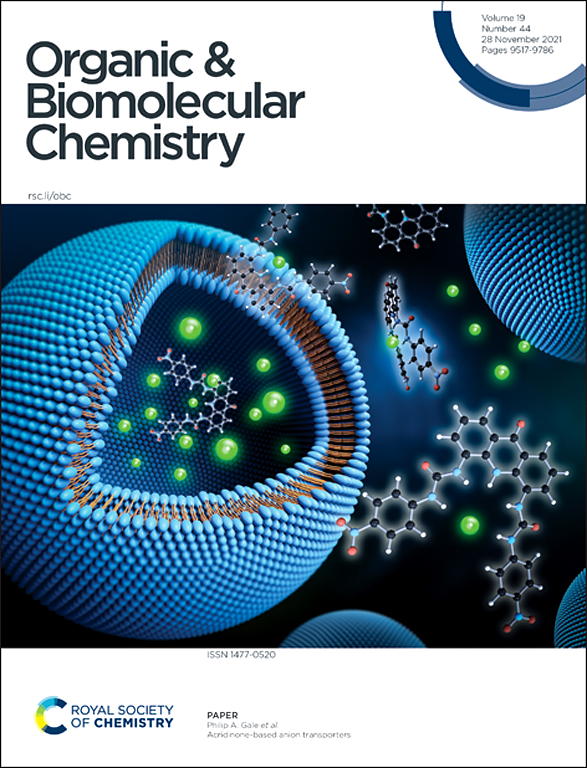用铂和二氧化硅催化过氧化氢氧化法从醇连续流合成羧酸。
IF 2.7
3区 化学
Q1 CHEMISTRY, ORGANIC
引用次数: 0
摘要
报告采用过氧化氢(H2O2)和铂(Pt)催化剂,在流动反应器系统中以连续流方式将醇直接氧化成羧酸。这种方法可以精确控制反应物与催化剂之间的接触时间,从而优化反应条件。通过分析醛和羧酸的产率与重量时空速度(WHSV)的函数关系,实现了羧酸的选择性合成,而不会生成相应的醛。铂催化剂表现出卓越的稳定性,使用内径为 5 毫米 × 100 毫米的色谱柱,在重量小时空间速度为 1.3 小时-1 的条件下,经过 210 小时,从 1-辛醇中生产出 25.2 克辛酸,收率超过 96%。这种铂催化的连续流 H2O2 氧化法对包括脂肪族、芳香族、烯丙基和杂芳香族在内的多种醇具有良好的反应活性,能以 19-98% 的分离产率获得相应的羧酸,水是唯一的副产物。X 射线光电子能谱 (XPS) 分析证实,在整个反应过程中,金属零价铂(Pt(0))始终保持不变。本文章由计算机程序翻译,如有差异,请以英文原文为准。

Continuous-flow synthesis of carboxylic acids from alcohols via platinum and silicon dioxide-catalyzed hydrogen peroxide oxidation†
A continuous-flow method for the direct oxidation of alcohols to carboxylic acids is reported, employing hydrogen peroxide (H2O2) and a platinum (Pt) catalyst within a flow reactor system. This approach allows for precise control over the contact time between the reactants and the catalyst, enabling optimization of reaction conditions. By analyzing the yields of both aldehydes and carboxylic acids as a function of weight hourly space velocity (WHSV), selective synthesis of carboxylic acids was achieved without the formation of corresponding aldehydes. The Pt catalyst exhibited excellent stability, producing 25.2 g of octanoic acid from 1-octanol with a yield exceeding 96% over 210 h at a WHSV of 1.3 h−1 using a 5 mm inner diameter × 100 mm column. This Pt-catalyzed continuous-flow H2O2 oxidation method demonstrates good reactivity for a variety of alcohols, including aliphatic, aromatic, allylic, and heteroaromatic, affording the corresponding carboxylic acids in 19–98% isolated yields with water as the sole byproduct. X-ray photoelectron spectroscopy (XPS) analysis confirmed the preservation of metallic zero-valent Pt (Pt(0)) throughout the reaction.
求助全文
通过发布文献求助,成功后即可免费获取论文全文。
去求助
来源期刊

Organic & Biomolecular Chemistry
化学-有机化学
CiteScore
5.50
自引率
9.40%
发文量
1056
审稿时长
1.3 months
期刊介绍:
Organic & Biomolecular Chemistry is an international journal using integrated research in chemistry-organic chemistry. Founded in 2003 by the Royal Society of Chemistry, the journal is published in Semimonthly issues and has been indexed by SCIE, a leading international database. The journal focuses on the key research and cutting-edge progress in the field of chemistry-organic chemistry, publishes and reports the research results in this field in a timely manner, and is committed to becoming a window and platform for rapid academic exchanges among peers in this field. The journal's impact factor in 2023 is 2.9, and its CiteScore is 5.5.
 求助内容:
求助内容: 应助结果提醒方式:
应助结果提醒方式:


